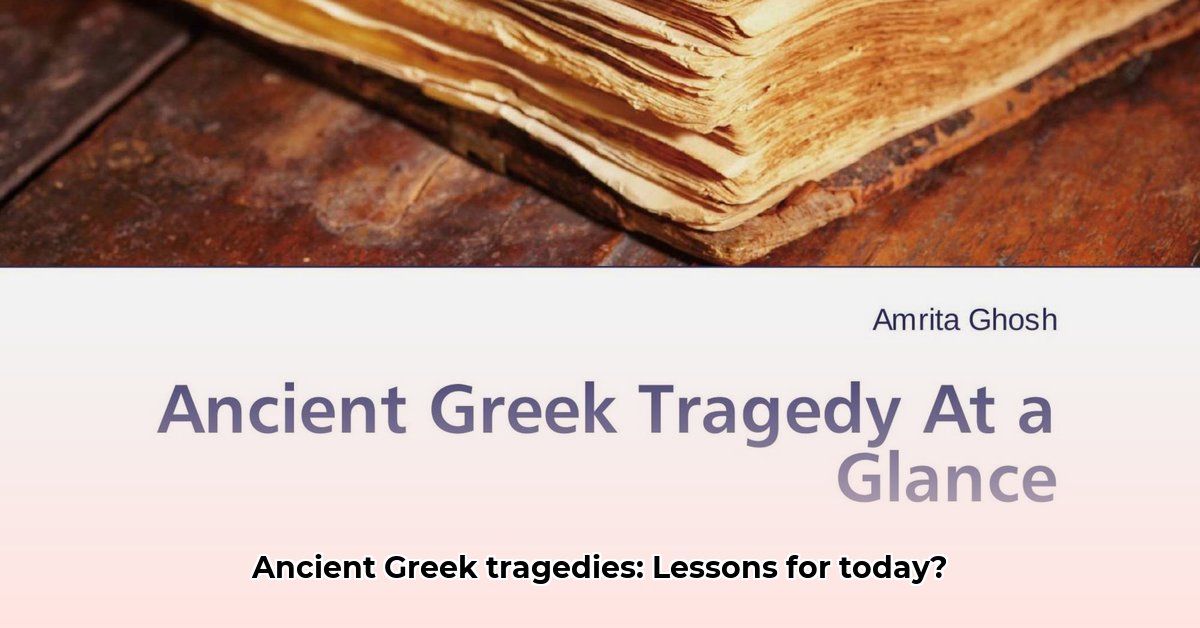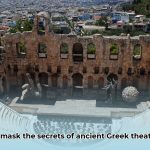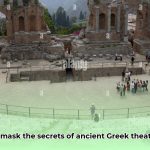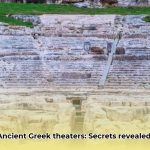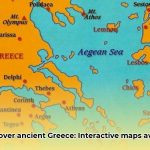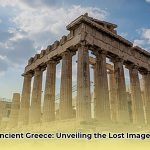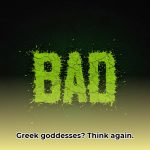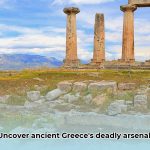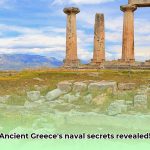Why do stories of doomed heroes and epic struggles continue to captivate us? Ancient Greek tragedy offers profound insights into the human condition. Beyond the surface, plays like Antigone and Oedipus Rex reveal enduring truths about fate, choice, and the essence of humanity. By examining the chanting chorus, the tragic flaws of iconic characters, and the profound questions these dramas raise, we can gain a deeper understanding of ourselves and the world around us. Prepare for a journey into a world both ancient and astonishingly modern. What makes these ancient stories so perpetually relevant and universally captivating?
Tragedy in Ancient Greece: Timeless Lessons and Dramatic Performances
Imagine traveling back to ancient Greece, a civilization where storytelling and religion were inextricably linked. Picture emotionally charged theatrical performances—more than mere plays, these were powerful rituals—that delved into the deepest recesses of human experience. That encapsulates ancient Greek tragedy. It was not simple entertainment; it was a crucial component of Athenian life, a method of confronting the fundamental questions of existence. Consider the pivotal role tragedies played in ancient Athenian society, providing a context through which communities could process intricate ideas and moral dilemmas.
The Genesis of Tragedy: From Ritual to Dramatic Art
These dramatic performances originated as choral odes, hymns intoned in honor of Dionysus, the god of wine, fertility, and theater. Gradually, these odes transformed. Dialogue was added, characters emerged, and narratives unfolded, evolving these religious ceremonies into a sophisticated art form. This evolution parallels a band’s progression from a simple chant to a complex rock opera—intense, captivating, and profoundly moving. Can we draw parallels with modern performance art that blends diverse mediums to engage modern audiences?
Titans of the Stage: Aeschylus, Sophocles, and Euripides
Among the playwrights of ancient Greece, Aeschylus, Sophocles, and Euripides stand as titans of the genre. Each left an indelible legacy, sculpting the art form with their unique visions. Aeschylus, often hailed as the “father of tragedy,” established many conventions still recognized in modern theater. Sophocles refined the structure of plays, enhancing their storytelling precision and crafting complex characters. Euripides, a rebel and innovator, challenged societal norms and explored the complexities of human psychology through realistic characters. He fearlessly posed difficult questions, pushing the boundaries of tragedy. How did the styles of Aeschylus, Sophocles, and Euripides revolutionize storytelling, and how do their approaches resonate in contemporary narrative forms?
Unraveling the Mysteries: Fate, Free Will, and Hubris
Why do these ancient plays remain relevant today? The answer resides in their exploration of timeless themes. The tension between fate and free will—are our lives predetermined, or do we possess genuine control over our choices?—is central. Hubris (excessive pride), leads to a character’s downfall. Consider Oedipus Rex, whose arrogance blinds him to the truth, culminating in his tragic demise. These plays offer no easy answers; instead, they investigate the complexities of the human condition, portraying struggles that resonate with today’s world and the individual challenges faced by people.
* Exploration of universal themes—fate versus free will—maintains relevance.
* Hubris reflects inherent flaws in the human condition.
* Complex characters and storylines delve into ethical considerations.
Structure, Style, and Spectacle of Classic Plots
The structure of these plays is as captivating as their themes. The chorus, a group of singers and dancers, played a significant role by commenting on the action, foreshadowing events, and offering emotional insights. Imagine a modern play, where a Greek chorus provides insightful commentary, similar to a live-action Greek Twitter feed. The use of masks enhanced the visual spectacle, allowing actors to portray multiple roles and amplifying the drama, combining music, dance, and drama in ways that few theatrical experiences can match. How can modern performances capture the grandeur and emotional depth of ancient Greek tragedies?
Legacy: The Enduring Impact of Greek Tragedy
The impact of ancient Greek tragedies extends far beyond their time. Shakespeare drew inspiration from Greek myths and dramatic structures. Modern playwrights and filmmakers continue to adapt and reinterpret these stories, underscoring the enduring power of their themes. The human condition—our successes and failures, our joys and sorrows—endures. These tragedies offer a mirror, reflecting our vulnerabilities and aspirations. Does the reinterpretation of these themes challenge or reinforce our understanding of shared human experiences?
Asking the Big Questions: Ongoing Debates and Discoveries
These plays continue to provoke discussions and diverse interpretations. Ongoing research reveals new layers of understanding, proving their relevance. How much control do we have over our lives? How do individual desires conflict with societal forces? These questions explore fundamental aspects of the human experience. Engaging with these ancient texts provides a unique perspective. Greek tragedy is a journey through time, allowing us to connect with characters grappling with dilemmas that remain pertinent today. Their struggles remind us of the universal nature of the human experience—its complexity, beauty, and tragedy. How do evolving societal values influence our interpretation of ancient Greek tragedies?
The Enduring Impact of Greek Tragedy: A Lasting Legacy
| Stakeholder Group | Immediate Impact | Long-Term Impact |
|---|---|---|
| Theater Professionals | Inspiration, innovative stagecraft and direction | New theatrical conventions, pushing creative boundaries |
| Educators | Engaging lesson plans, stimulating classroom discussions | Improved critical thinking, fostering interdisciplinary studies |
| Filmmakers and Screenwriters | Inspiration for compelling stories, modern adaptations | Exploration of themes through new perspectives |
| Scholars and Researchers | Research avenues, re-interpretations of classic texts | Enhanced understanding of human nature, societal impact |
How can education leverage the legacy of these performances to enhance modern understanding?
Adapting Greek Tragedy for Modern Audiences
Greek tragedy delivers timeless themes easily adapted to modern contexts. Reimagined structural elements engage modern audiences. Archetypal characters resonate, even when recontextualized. Adaptations address social and political issues. Diverse casting and setting choices broaden appeal. Debate continues regarding faithfulness versus innovative reinterpretation.
Reimagining Ancient Drama: Adapting Greek Tragedy for Modern Stages
Greek tragedies, are a mix of myth, human frailty, and poetry, and they continue to intrigue modern audiences. But, how do we make these stories resonate today? The key is understanding what these plays are about and how they work. Understanding the elements allows adaptions to bring them to the forefront.
From Chorus to Commentary: Adapting Classical Structure
Consider the Greek chorus, which provided commentary and foreshadowing. In modern adaptations, this function can be fulfilled by a narrator, social media feeds, or a live band. The possibilities are endless! Addressing how to adapt Greek tragedy themes for modern audiences involves rethinking structural elements. Don’t copy; reinvent. Euripides’ relatable characters can engage audiences through familiar narratives.
* Modern adaptations creatively reimagine structural elements.
* A narrator or social media provides commentary.
* Structural reinvention allows for more dynamic plays.
Archetypes and Their Modern Counterparts
Greek tragedies include archetypes: the tragic hero, the flawed king, and the loyal friend. These represent universal human experiences. Consider Antigone in Ferguson, which relocates Sophocles’ classic to modern racial injustice and exemplifies how how to adapt Greek tragedy themes for modern audiences captures the human condition.
Universal Themes, Modern Resonances
The themes of Greek tragedy—fate versus free will, hubris, and the struggle for justice—resonate. A modern adaptation might explore these themes through political corruption or environmental destruction, through re-examining classic conflicts. How do modern directors portray hubris in leaders?
The Debate: Faithfulness vs. Freedom
Striking a balance between honoring the source material and creating a compelling contemporary work presents a challenge in how to adapt Greek tragedy themes for modern audiences. Some productions strive for faithfulness, emphasizing language and style. Others prioritize reinterpretation, but the key is understanding the choices you make.
Harnessing Adaptation and Storytelling
Ultimately, adaptation success hinges on capturing the emotional power of the original while reshaping its form. It’s about finding where ancient wisdom meets sensibilities. By considering the structure, characters, and themes, we unlock the lessons of Greek tragedy.
Mastering Ancient Greek Tragedy for Modern Stage Adaptations
Ancient Greek tragedy’s impact stems from structure, themes, and character archetypes. Adapting these plays requires sensitivity. The chorus presents an opportunity. Understanding ancient Greece avoids misinterpretations. Modern adaptations thrive on staging and interpretations.
The Chorus: A Bridge Between Past and Present
How do you translate the Greek chorus to a modern audience? It’s a question when Mastering the Art of Ancient Greek Tragedy for Modern Stage Adaptations. The chorus commented on the action but how do we make it relevant? Some productions retain the chorus and reinterpret, while others integrate their function by finding creative ways to maintain commentary. Think of it as a challenge – how do you preserve the essence while updating the form? Is the goal to increase engagement by making the stories more relatable?
Fate, Hubris, and the Modern Condition
Ancient Greek tragedies explore fate and hubris. Oedipus Rex shows Oedipus’s hubris and questions – aren’t these timeless anxieties? Mastering the Art of Ancient Greek Tragedy for Modern Stage Adaptations involves recognizing these themes. What are the modern equivalents of fate and hubris? Can social media fame parallel the hubris that leads to downfalls?
Reimagining the Tragic Hero
The tragic hero remains a powerful archetype. Consider the similarities between Oedipus and figures in film. They often possess flaws leading to their downfall. Mastering the Art of Ancient Greek Tragedy for Modern Stage Adaptations also requires exploring how this archetype has evolved. While the fall from grace remains central, it reflects evolving societal values. Can exploring the underlying motivations of the tragic hero lead to greater audience engagement?
Translating Language and Context
Translating ancient Greek is far more than a substitution. It demands sensitivity. A successful adaptation understands capturing the spirit, emotion, and message. Mastering the Art of Ancient Greek Tragedy for Modern Stage Adaptations necessitates understanding the original text and culture to convey its meaning. Could adding modern-day slang engage the audience?
The Challenges and Rewards of Adaptation
Adapting Greek tragedies poses challenges. The language and culture require consideration. However, the rewards are significant. Modern artists can breathe new life into these masterpieces, by revealing the human condition.
Exploring the Influence of Ancient Greek Tragedy on Elizabethan Drama
Elizabethan tragedy drew from Greek traditions, through thematic similarities, structural elements, and character archetypes. Transmission occurred through Latin translations and Roman adaptations. The extent of borrowing versus development remains debated. Shakespeare’s engagement with Greek texts is a key discussion area, and this influence impacted theatrical development.
Thematic Resonance: Fate, Hubris, and the Tragic Flaw
Think of Shakespeare’s Macbeth – a man driven by ambition (hubris). Doesn’t this echo Oedipus’s downfall? These parallels connect in thematic concerns. Exploring the influence of Ancient Greek Tragedy on Elizabethan Drama reveals a deep connection in thematic concerns. Both eras explored fate and the human flaws, and the inevitability of tragedy. What cultural anxieties allowed Greek and Elizabethan audiences to engage with themes of morality and justice?
This isn’t about similar stories, but instead, shared cultural values and anxieties. Both Greek and Elizabethan audiences grappled with mortality, justice, and power. Their tragedies reflected these anxieties, utilizing similar dramatic structures.
Structural Echoes: From Chorus to Soliloquy
The structure of Greek tragedy influenced the architecture of Elizabethan plays. Though the chorus disappears, its function finds echoes in dramatic conventions, such as soliloquies and asides. Consider how Shakespeare uses these narrative devices to provide audience insights, like the Greek chorus. Can a comparison be drawn between the Greek chorus and social media as a vehicle of audience insight?
The Seneca Connection: A Bridge Across Time
Seneca, a Roman playwright influenced by Greek tragedy, transmitted classical themes to Elizabethan England. His works provided playwrights with models and philosophical ideas. This highlights that exploring the influence of Ancient Greek Tragedy on Elizabethan Drama isn’t about direct transmission.
Shakespeare’s Greek: A Continuing Debate
How much did Shakespeare know about Greek tragedy? This question sparks debate. Did his knowledge come indirectly, through Seneca, or secondary sources? This uncertainty underscores tracing this influence, acknowledging textual evidence is scarce. In what capacity can it be confirmed that Shakespeare’s plays were influenced through Greek teachings?
Beyond Shakespeare: A Broader Influence
While Shakespeare dominates, exploring the influence of Ancient Greek Tragedy on Elizabethan Drama should extend beyond a single playwright. Many engaged with themes and structures, revealing a pervasive influence. The legacy extends beyond to a cultural exchange.
A Lasting Legacy
The influence of Greek tragedy on Elizabethan drama is undeniable and shapes a theatrical tradition. While the extent of borrowing continues to be debated, the parallels remain compelling. The resonance of Greek tragedy in Elizabethan forms underscores its power.
- Rediscover the Bad Girls of Ancient Greece: A Feminist Retelling - August 9, 2025
- Discover Ancient Greece Weapons: A Comprehensive Guide to Military Technology - August 8, 2025
- Discover Ancient Greek Swords: A Comprehensive Guide - August 8, 2025
